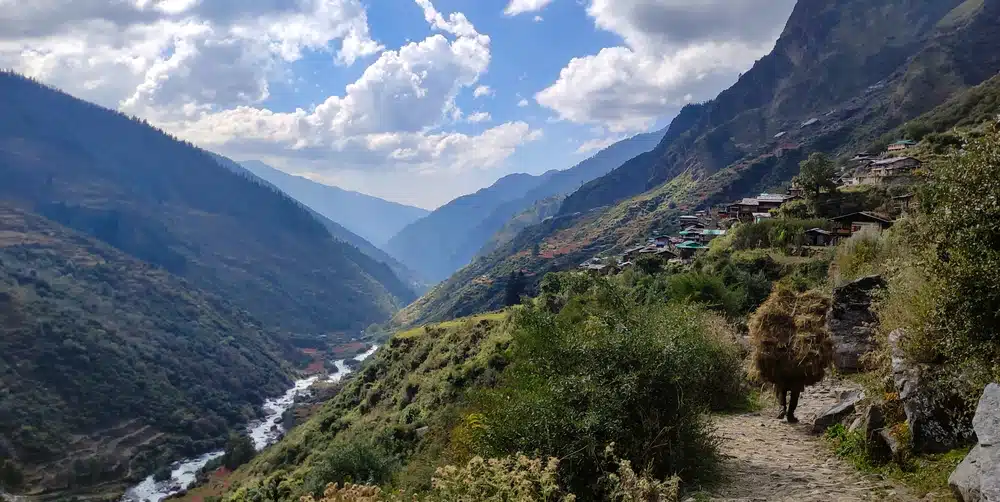Himachal Pradesh, a state renowned for its breathtaking landscapes and rich cultural heritage, is embarking on a transformative journey towards sustainable development and biodiversity conservation through its new eco-tourism projects.
With an investment of INR 16.67 crore, these projects, situated in Hareta Gram Panchayat and Kamyana Hilltop, are poised to become beacons of eco-friendly tourism, providing employment opportunities and leveraging technology for wildlife conservation.
The Hareta Gram Panchayat project, enveloping 1.2 hectares, will see the development of amenities like grasslands, tree houses, walking trails, and a cafeteria, engaging around 60 Self-Help Groups.
Conversely, the Kamyana Hilltop project will feature attractions like tree-top accommodations, a cafeteria, landscape zones, a children’s garden, and adventure activities, with the participation of 24 Self-Help Groups, each contributing to the overarching goal of promoting sustainable tourism and biodiversity conservation.
The Himachal Pradesh Model Eco-Village Scheme 2017, a pivotal initiative, aims to build resilient village communities, equipping them with skills to navigate challenges like resource depletion and climate change, according to a report by Real Time India.
This scheme underscores the potential of eco-villages to redefine rural living and set a precedent for sustainable development that transcends geographical boundaries, thereby promoting transformative action and achieving sustainable development through environmentally responsible practices.
Eco-villages, as envisioned in Himachal Pradesh, are not merely habitations but catalysts for tourism generation, contributing to increased employment prospects, income generation, and an elevated quality of life for residents through enhanced living standards.
They aim to achieve a balance between human aspirations and environmental integrity, creating a comprehensive habitat that harmonizes both aspects, thereby promoting sustainable tourism and development.
The challenges faced by Himachal Pradesh, such as the effects of global climate change, shifts in temperature patterns, glacial retreat, altered precipitation regimes, and increased occurrences of extreme weather events, are significant.
Traditional farming practices are constrained by changing weather patterns, limited access to modern technology, and a lack of diversified income sources, thereby necessitating innovative solutions like eco-tourism projects.
The opportunities presented by these challenges are manifold. By harnessing the potential of eco-tourism, Himachal Pradesh can navigate through these challenges, providing sustainable employment opportunities, preserving its rich biodiversity, and ensuring the sustainable development of its rural regions.
The eco-tourism projects, therefore, are not merely developmental initiatives but a strategic approach towards ensuring the long-term sustainability of the state’s economy and ecology.
The recent development of a master plan to expand eco-tourism activities to 93 proposed sites across Himachal Pradesh underscores the state’s commitment to maximizing the benefits of eco-tourism.
This comprehensive approach seeks to preserve the state’s natural beauty and cultural heritage while promoting its rich biodiversity, scenic landscapes, and cultural heritage to attract tourists interested in responsible and sustainable travel.
Implementing this master plan will not only help the state capitalize on its eco-tourism potential but also present a compelling offering to tourists, contributing to the growth and well-being of local communities.
By doing so, eco-tourism can create employment opportunities for local youth and contribute to the overall economy, thereby aligning with the state government’s vision to position Himachal Pradesh as a prime destination for responsible travelers seeking authentic and sustainable experiences.
The extensive eco-tourism initiatives, including 72 Forest Rest Houses and 22 eco-parks, are already underway in Himachal Pradesh, showcasing the state’s proactive approach towards eco-tourism.
The Chief Minister has emphasized the need to expedite the master plan, describing eco-tourism as a sustainable form of travel that promotes conservation of natural resources and local culture while providing visitors with unique experiences.
The collaboration with local communities, self-help groups, and various departments like Panchayati Raj, Forest, Tourism, and Rural Development is pivotal in these eco-tourism projects.
This collaborative approach not only ensures the inclusive development of the projects but also guarantees that they are deeply rooted in the local context, thereby ensuring their sustainability and success in the long run.
The involvement of local communities ensures that the projects are not only beneficial from an economic perspective but also culturally and ecologically sensitive.



Encountering the eco-tourism projects in Himachal Pradesh was genuinely astonishing! The initiative’s focus on organic farming and traditional craft workshops gives visitors a chance to experience sustainable living and cultural heritage. Also, involving Self-Help Groups in managing homestays and community-based tourism is a great way to promote inclusive economic growth and empowerment at the grassroots level. It’s truly remarkable to see such efforts towards sustainable rural development and biodiversity conservation.
Imagine stepping into Himachal Pradesh’s green eco-tourism spots, soaking up those sustainable vibes and conservation efforts. It’s more than just jobs – these projects involve communities like us in preserving our natural treasures. Every visit is like giving back to the environment. Cool, right?